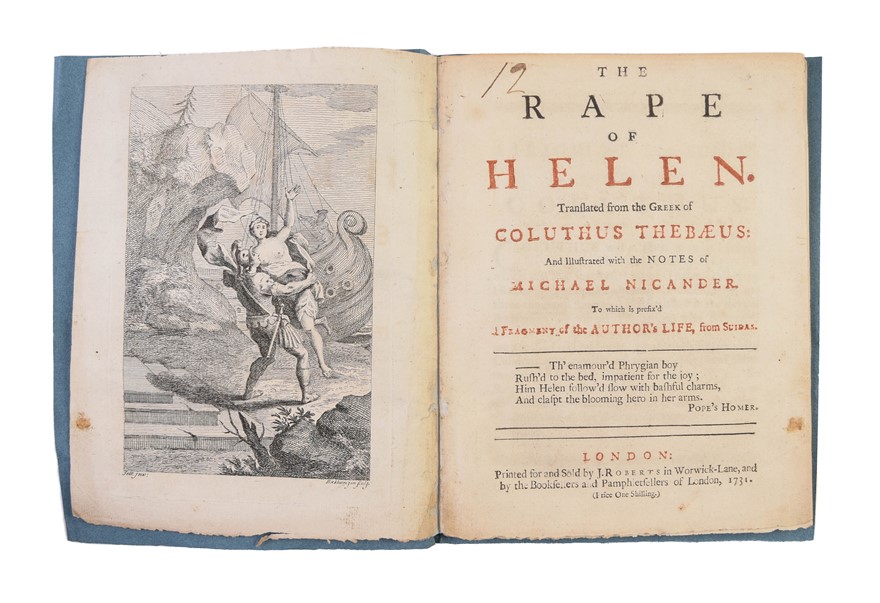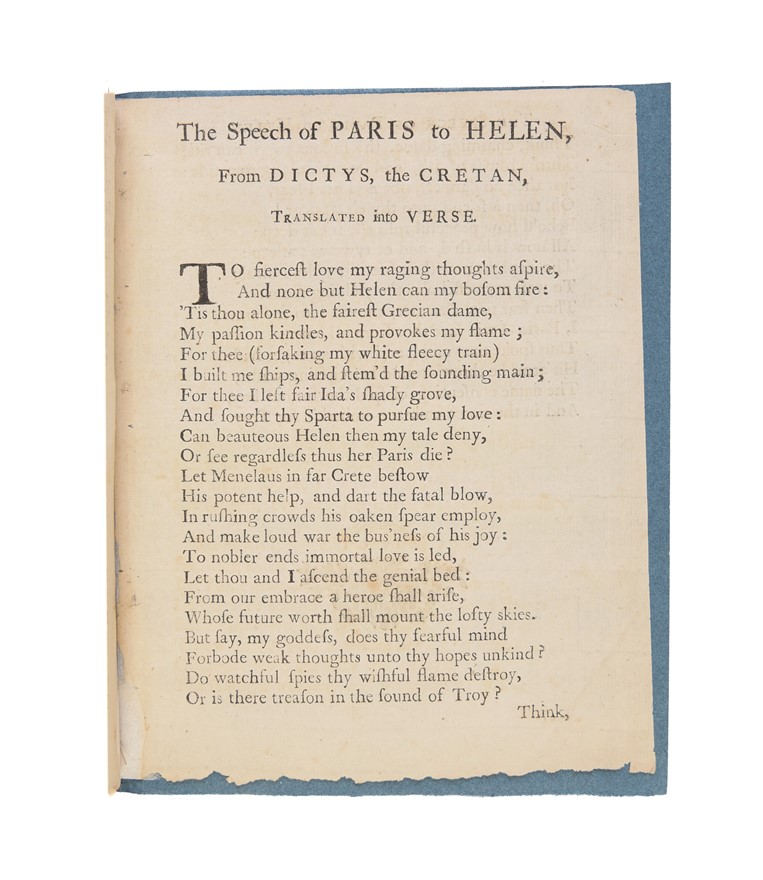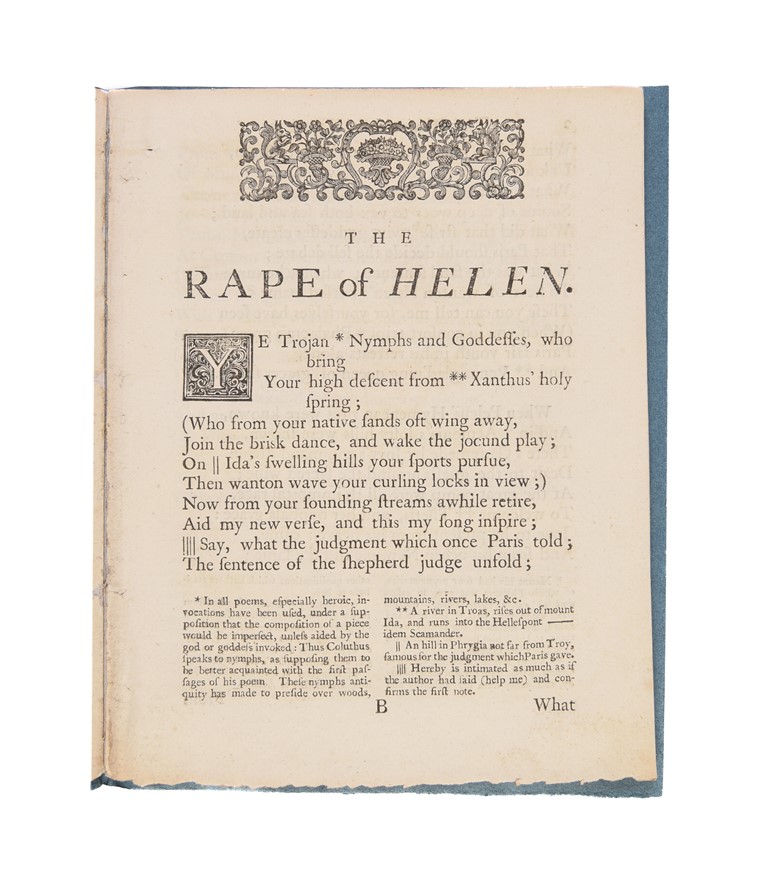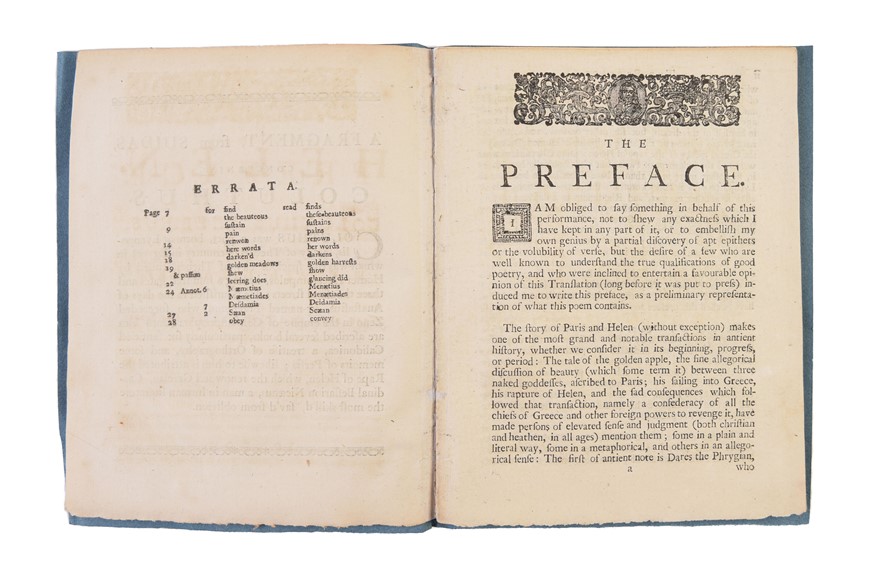The Rape of Helen.
COLLUTHUS OF LYCOPOLIS (1731)
£2500.00 [First Edition]
Please contact us in advance if you would like to view this book at our Curzon Street shop.
“THIS POEM MIGHT HAVE RECEIVED A GREAT ADVANTAGE FROM THE MASTERLY HAND OF MR. POPE”
Translated from the Greek of Coluthus Thebaeys: and Illustrated with the Notes of Michael Nicander. To which is prefix’d A Fragment of the Author’s Life, from Suidas.
First Edition. Small 4to (200 x 159mm). [4], viii, 34, [2] pp., with an engraved frontispiece by Bickham showing Helen being taken by Paris. A little browed and grubby in places, frontispiece carefully guarded on a stub, some very minor repair work in the inner margin (where the old stitching has torn), lower edge uncut, errata neatly corrected in an early hand. Disbound from a larger tract volume and bound in modern blue paper wrappers.
London: J. Roberts,
Foxon, R118. Rare. ESTC lists copies at the BL (lacking the frontispiece), Cambridge, and Bodley; Duke, and Harvard (ESTC erroneously records two copies) in the US.
A curious translation of an obscure account of the abduction of Helen of Troy. Translated by a young man and intended, “to be read, previous to Mr. Pope’s Translation of Homer’s Illiads”.
A translation with critical notes of the only surviving work by Colluthus, an Egyptian poet of the fifth century AD. Colluthus’ poem recounts the story of Paris and Helen. This translation contains a biographical extract on Colluthus from Suidas, a preface from the anonymous translator, the poem itself (with editorial notes by “Michael Nicander”) and Paris’ speech to Helen as recorded by Dictys the Cretian (included as an additional leaf at the end of the work.)
The poem itself is a short work of 392 lines which covers the Judgement of Paris, his subsequent abduction of Helen, and the grief-stricken reaction of Helen’s daughter Hermione - told firstly from the poet’s perspective, and then from Hermione’s.
The long preface is in some ways more interesting and entertaining than the poem which follows it. The translator seeks to defend the quality both of Colluthus’ poetic style, and of his translation of that style - and in so doing, oscillates between cautious self-justification and bullish self-assertion. The translator notes “some gentlemen, to whom I lie under no small obligations” (p. v) persuaded him to publish this translation produced “some years since” (p. v) and circulated privately at the time with the translator admitting the work was, written and performed before the full age of seventeen" (p. v).
This image of the precocious young scholar is further developed as "a young fellow (very desirous to appear in print)...his ardor of mind and earnest sollicitations for such a purpose... cross’d and retarded by penury and ill fortune “ (p. vii). Indeed, "I believe not many better translations, especially from the Greek...are to be found in this city, and more especially by one who thro’ a slender patrimony has been confined to a scanty library, and his life hitherto represented one continual scene of trouble” (p. v).
The translator acknowledges that, “this poem might have received a great advantage from the masterly hand of Mr. Pope; and I have often wonder’d that it never had the fortune to fall under his notice especially since it contains all those passages which are previous to Homer’s Illiad…Mr Pope would doubtless (he he performed the translation) have given his verse a more gay turn of expression, and delighted his readers with his usual briskness, which is so conspicuous in all his performances, and which makes him the delight of his countrymen.” (p. vii)
Virtually from the moment of its modern rediscovery, Colluthus and his poem have received an extraordinarily negative assessment from scholars and audiences alike. Michael Paschalis quotes Martin West as stating that "Colluthus is one of the very worst ancient poets to have come down to us... Colluthus can give delight, but only to a connoisseur of the ludicrous " (p. 136).
The poem’s publication history tends to bear out such assessments. The first printed edition appeared in 1504-5 in a collection from the Aldine presses at Venice.
In spite of its reputation, Colluthus’ poem has received increasing scholarly attention in recent years. Modern critical editions of the text have been undertaken by Enrico Livrea (1968) and Orestis Karavas (2015). The text similarly received its first English monograph in 2015, while the work of Paschalis and Enrico Magnelli has gone some way to challenging the poem’s legendarily bad reputation.
The present edition ostensibly reproduces the ‘Notes of Michael Nicander’ which appears to be a reference to the German educationalist, Michael Neander, whose edition of Colluthus was first published in 1559 and “repeatedly reprinted” thereafter with his editorial comments throughout. The similarity between ‘Michael Nicander’ and ‘Michael Neander’, suggests that the translator was in fact working from an edition of Neander’s educational primer – a likely enough source for the deprived young writer depicted in the preface.
The book was advertised as “Just Published…with a Frontispiece suitable to the Subject” at the beginning of August 1731. The advertisement notes:
“As this poem hath been inserted in several Editions of those Transactions printed at Geneva, and contains the Original Cause of those Transactions upon which the Illiads are founded, and which occasioned those Calamities that befell the Trojan City, it is esteemed a Piece proper to read, previous to Mr. Pope’s Translation of Homer’s Illiads.” (see Daily Post, 14th August 1731.)
Provenance: Disbound from a larger volume with an old ink number “12” on the title-page. Most likely from the library of Sir William Forbes of Pitsligo which was dispersed by Sotheby’s in 2016.
Stock Code: 248215







